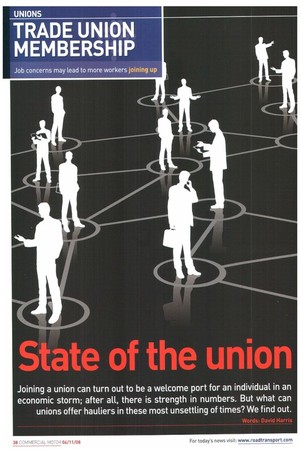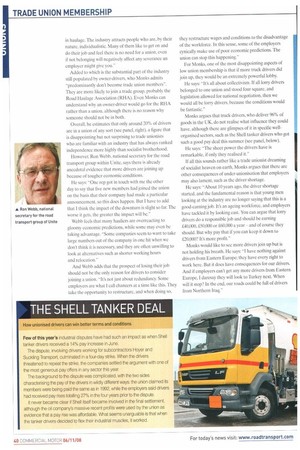Joining a union can turn out to be a welcome
Page 38

Page 39

Page 40

If you've noticed an error in this article please click here to report it so we can fix it.
port for an individual in an economic storm; after all, there is strength in numbers. But what can unions offer hauliers in these most unsettling of times? We find Out.
Words: David Harris
joining a trade union? For truck drivers, the question is ever present but becomes more pressing when times are hard. Anybody working for a haulier is likely to need help not when their job is secure but when it comes under threat.
In those circumstances, a union may offer the best chance either to save the job or, at least, make severance terms as generous as possible. So, in a recession, joining a union may seem more attractive.
That is what unions themselves argue. Bob Monks, general secretary of the United Road Transport Union (URTU), says "this is certainly the time for people to join". He adds that the URTU is expecting its workload to increase as the industry is hit with increased redundancies, although he says this has not been particularly apparent so far.
"I think we are all waiting for it to bite, aren't we? So far, I don't think there have been more companies than usual going under, although it may be that some are not replacing staff that retire," he adds. The other two road haulage unions — Unite and the GMB — agree with the URTU that, in difficult times, a union is more important, not less.
A spokesman for the GMB adds that "the most important thing is that no corners are cut in employees' interests and that redundancy should be a last resort".
But first unions have to get drivers and other haulage workers to join up. And most admit that this is far from straightforward.
Monks says: -It's a perennial problem in haulage. The industry attracts people who are, by their nature, individualistic. Many of them like to get on and do their job and feel there is no need for a union, even if not belonging will negatively affect any severance an employer might give you."
Added to which is the substantial part of the industry still populated by owner-drivers, who Monks admits "predominantly don't become trade union members". They are more likely to join a trade group. probably the Road Haulage Association (RHA). Even Monks can understand why an owner-driver would go for the RHA rather than a union, although there is no reason why someone should not be in both.
Overall, he estimates that only around 20% of drivers are in a union of any sort (see panel, right), a figure that is disappointing but not surprising to trade unionists who are familiar with an industry that has always ranked independence more highly than socialist brotherhood.
However, Ron Webb, national secretary for the road transport group within Unite, says there is already anecdotal evidence that more drivers are joining up because of tougher economic conditions.
He says: "One rep got in touch with me the other day to say that five new members had joined the union on the basis that their company had made a particular announcement, so this does happen. But I have to add that I think the impact of the downturn is slight so far. The worse it gets, the greater the impact will he.
Webb feels that many hauliers are overreacting to gloomy economic predictions, while some may even be taking advantage. "Some companies seem to want to take large numbers out of the company in one hit when we don't think it is necessary, and they are often unwilling to look at alternatives such as shorter working hours and relocation."
And Webb adds that the prospect of losing their job should not be the only reason for drivers to consider joining a union. -It's not just about redundancy. Some employers are what I call chancers at a time like this. They take the opportunity to restructure, and when doing so, they restructure wages and conditions to the disadvantage of the workforce. In this sense, some of the employers cynically make use of poor economic predictions. The union can stop this happening."
For Monks, one of the most disappointing aspects of low union membership is that if more truck drivers did join up, they would be an extremely powerful lobby.
He says: -It's all about collectivism. If all lorry drivers belonged to one union and stood four square, and legislation allowed for national negotiation, then we would all be lorry drivers, because the conditions would be fantastic."
Monks argues that truck drivers, who deliver 96% of goods in the UK, do not realise what influence they could have, although there are glimpses of it in specific wellorganised sectors, such as the Shell tanker drivers who got such a good pay deal this summer (see panel, below).
He says: "The sheer power the drivers have is remarkable, if only they realised it.
If all this sounds rather like a trade unionist dreaming of socialist heaven on earth, Monks argues that there are other consequences of under-unionisation that employers may also lament, such as the driver shortage.
He says: "About 10 years ago, the driver shortage started, and the fundamental reason is that young men looking at the industry are no longer saying that this is a good-earning job. It's an ageing workforce, and employers have tackled it by looking east. You can argue that lorry drivers do a responsible job and should be earning £40,000, £50,000 or £60.000 a year — and of course they should. But why pay that if you can keep it down to £20,000? It's more profit."
Monks would like to see more drivers join up but is not holding his breath. He says: "I have nothing against drivers from Eastern Europe; they have every right to work here. But it does have consequences for our drivers. And if employers can't get any more drivers from Eastern Europe, I daresay they will look to Turkey next. When will it stop? In the end, our roads could be full of drivers from Northern Iraq."




























































































































































